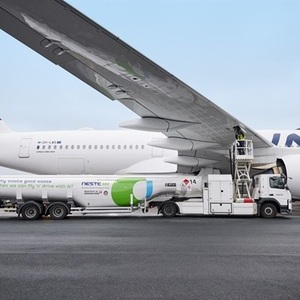Neste: Finnair reduces CO2 emissions with SAF

SOURCE: Neste Corp.
March 20, 2023
BY Neste Corp.
Finnair has purchased 750 tons of Neste MY Sustainable Aviation Fuel from Neste to reduce the carbon emissions from flights departing from Helsinki Airport in Finland. Sustainable aviation fuel (SAF) is one of the most important tools for reducing the emissions of air travel in the coming years and is available for all airlines at Helsinki Airport.
Finnair aims to achieve carbon neutrality by 2045, and the use of sustainable aviation fuel is an important tool in this regard. Using Neste MY Sustainable Aviation Fuel reduces greenhouse gas emissions by up to 80 percent* over the fuel’s life cycle compared to using fossil jet fuel. The fuel volume now purchased is Finnair's single largest batch of sustainable aviation fuel purchased to date. The SAF will be delivered by Neste to Helsinki Airport in early 2023. The 750 tons of SAF corresponds to approximately 400 flights between Helsinki and Stockholm using unblended, 100 percent SAF. Currently, SAF can be used blended up to 50 percent with conventional fossil jet fuel.
"Finnair celebrates its 100th anniversary this year, and reducing emissions from flying is an essential part of a sustainable future. Sustainable aviation fuel will be one of the most important tools for reducing emissions in the coming years. We also involve our customers in this, and a small part of every flight ticket sold goes to the cost of sustainable aviation fuel," says Eveliina Huurre, Finnair's SVP, sustainability. “Reducing emissions from flying requires an extensive toolkit and everyone's effort. While we are increasing the use of SAF, we will also continue to take all other steps, from reducing the weight of aircraft to optimizing flight routes and increasing fuel efficiency."
Advertisement
“Finnair was one of the first airlines using our Neste MY Sustainable Aviation Fuel. We have been working together for a long time and look forward to supporting Finnair to meet its sustainability targets,” says Jonathan Wood, vice president commercial and technical management, renewable aviation at Neste. “It is great to see Finnair taking the initiative to voluntarily purchase our SAF as part of their sustainability commitments, and creating awareness among their customers on how to play a role in creating a more sustainable future.”
Sustainable aviation fuel
SAF is a renewable aviation fuel providing a more sustainable alternative to conventional, fossil based jet fuel. Neste MY Sustainable Aviation Fuel is produced from sustainably sourced, 100 percent renewable waste and residue raw materials, including used cooking oil and animal fat waste. SAF is blended with conventional jet fuel and works seamlessly with existing aircraft engines and fueling infrastructure.
Advertisement
*) When used in neat form (i.e. unblended) and calculated with established life cycle assessment (LCA) methodologies, such as CORSIA methodology
Related Stories
ADM and Mitsubishi Corp. on March 27 announced the signing of a non-binding memorandum of understanding (MOU) to form a strategic alliance to explore potential areas of future collaboration across the agriculture value chain.
The International Air Transport Association has established the Civil Aviation Decarbonization Organization to manage the IATA-developed Sustainable Aviation Fuel (SAF) Registry when it is released.
LRQA, the leading global assurance partner backed by Goldman Sachs Alternatives, has acquired EcoEngineers, a U.S.-based consulting, auditing and advisory firm with an exclusive focus on the energy transition.
The USDA on March 25 announced it will release previously obligated funding under the Rural Energy for America Program To receive the funds, applicants will be required to remove “harmful DEIA and “far-left climate features” from project proposals.
BIO, in partnership with Kearney, a global management consulting firm, on March 24 released a report showing the U.S. bioeconomy currently contributes $210 billion in direct economic impact to the U.S. economy, excluding healthcare.
Upcoming Events










